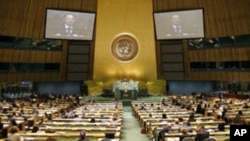The United Nations Millennium Development Goals Summit concluded with the recommitment by global leaders to achieve all 8 anti-poverty goals by 2015.
In attendance, was United States President Barack Obama, who took the opportunity to address the General Assembly. In his address, the President introduced the U.S.’ new, international global development policy, detailing the ways in which the policy would contribute to the success of the goals.
"Secretary of State [Hillary] Clinton," said President Obama, "is leading a review to strengthen and better coordinate our diplomacy and our development efforts. We’ve reengaged with multilateral development institutions. And we are rebuilding the United States Agency for International Development as the world’s premier development agency."
The President went on to outline the four major areas that constitute the underpinnings of the new policy. The first includes redefining development: "aid alone is not development," he said. "Development is helping nations to actually develop - moving from poverty to prosperity. And we need more than just aid to unleash that change." All resources, he avowed, from diplomacy to trade and investment policy, must be utilized.
The second looks beyond managing poverty to sustainable development solutions, focused on offering nations and peoples a path to prosperity and particularly partnering with countries who will take the lead.
The third, broad-based economic growth, asserts that while every country’s individual path toward prosperity is unique, certain principles, like entrepreneurship, investing in infrastructure, expanding trade, welcoming investment, and ensuring governments are accountable to their people, are necessary for building a successful foundation. The U.S. will assist in these efforts by taking measures to prevent corruption, promote transparency, and stand by those countries moving toward democracy and peace.
The final pillar is comprised of responsibility and mutual accountability. The U.S. will work with Congress to ensure that our investments are matched with the priorities of partner countries and hold donor nations accountable to commitments they have made.
President Obama concluded his speech by encouraging developing countries to take the lead and to make the difficult decisions for development in their countries, in a strong partnership with the United States.
Additionally, he encouraged donors to amend the premise under which they allocate aid: "Let’s move beyond the old, narrow debate over how much money we’re spending, and instead let’s focus on results - whether we’re actually making improvements in peoples' lives."
"In short," President Obama said, "we’re making sure that the United States will be a global leader in international development in the 21st century."
U.S. Announces Global Development Policy

U.S. President detailed ways in which the policy would contribute to the success of goals.
















